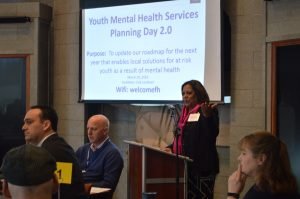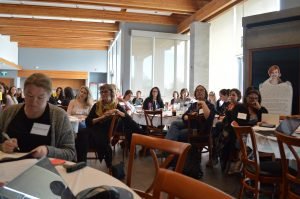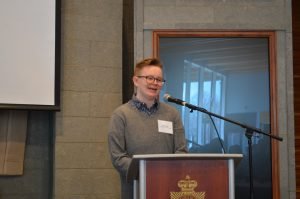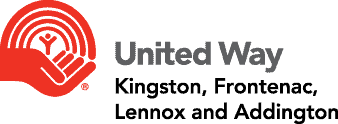
Bhavana Varma, President and CEO of United Way Kingston, Frontenac, Lennox and Addington, kicked off Youth Mental Health Services Planning Day 2.0 at Fort Henry on March 29, 2019.
In Kingston, Frontenac, Lennox & Addington, youth have shared some of the hurdles they face when it comes to receiving mental health support. In response to this issue, United Way KFL&A and Kingston Health Sciences Centre (KHSC) decided to bring agencies, healthcare professionals and youth together to start conversations and take action. This resulted in the first Youth Mental Health Services Planning Day in Kingston in March 2018. Now, one year later, they reconvened to assess successes following that first session and make plans for what’s next
After the inaugural planning day, the group recommended forming a strategic committee to work on some of the priorities identified. Those in attendance agreed that more needed to be done in relation to transitioning from hospital to community care; United Way and Kingston Health Sciences Centre agreed to co-chair this initiative to keep the momentum going.
“In the past few years we have seen progress against our plan to prevent and end youth homelessness and as part of that plan, a new strategic committee was recruited to look at mental health needs of youth,” explained Bhavana Varma, President and CEO of United Way KFL&A in her opening remarks on March 29. “Together, we have made a difference locally. There are other communities across the country that are looking to us to see what works and the secret sauce is really so many people in the community coming together to find solutions that will help youth now and in the future.”
The day started with MP Mark Gerretsen, MPP Ian Arthur and Mayor Bryan Paterson sharing their commitment to addressing the mental health needs of youth. Ashley O’Brien, coordinator at One Roof, was also on hand to give everyone an update on the impact the hub has made for youth in the community.
“In the past, as a frontline worker, when a youth would come in and see me I would often have to give them five or six different referrals in different locations, with different organizations, to have their needs met,” she explained. “Now, thanks to 27 organizations under one roof, most needs can be met on site, in an atmosphere that promotes connection and belonging.”

She also emphasized how important it is to continue to listen to youth, a message that echoed throughout the initial planning day and continued to echo during the follow up session.
“Our understanding of mental health and addictions is always evolving and it evolves by understanding and acknowledging the people who are suffering these experiences,” she said. “Seeing this many people here today who want to understand better and acknowledge these experiences I think is pretty incredible.”
The planning day consisted of a number of facilitated discussions lead by Erik Lockhart, Associate Director of the Queen’s Executive Decision Centre and focused on three main ideas; the need for safe spaces, crisis planning and discharge planning with a lot of attention paid to how youth interact with the emergency department at hospitals.
“The current situation for youth facing mental health issues is not ideal,” said Mike McDonald, Chief Nursing Executive and VP Patient Care and Community Partnerships at Kingston Health Sciences Centre. “We’ve continued to see a five per cent increase in youth using the emergency room over the last year and we know this is not the best place for them to receive support.”

Oliver Hill spoke of his own experiences with mental health services.
This sentiment was confirmed by local youth Oliver Hill who was one of three youth that spoke over the course of the day of their experiences with mental health issues and mental health support. As a young teenager Hill often found himself seeking support in times of crisis.
“There were many times when I would go to the hospital when I was suicidal and hurting myself, but that system had always failed me and I was sent home because I was assessed and told it wasn’t serious enough,” he explained to a room of over 70 front line workers and community members. “I never qualified because I was quiet and cooperative and they passed that as me being ok. They told me to make an appointment with my counsellor.”
Hill participated in discussions throughout the day and offered feedback based on his own experiences. He was joined by Kimaya, who shared her experiences with anxiety through two original songs; Alexis, who spoke of her experience with addictions and mental health and the help she received through Youth Diversion; and Marie Savage, a member of the South East Local Health Integration Network Patient and Family Advisory Committee, who spoke of her experiences with her daughter and her struggle with mental health. Their feedback resonated with everyone in the room and many appreciated their honesty.
“I can look at my own experiences in a negative way and let it eat me alive or I can look at it as a chance to learn and grow and I choose to look at it as an opportunity to help others,” said Alexis.
At the end of the day, the group provided input and ideas on an after-hours walk-in clinic for youth, defining a safe space for youth and services to be included, the possibility of developing an app to help youth connect with services, peer support and the need for continuous follow-up with youth post-crisis.
Those in attendance expressed gratitude to the youth for bravely sharing their stories and many committed to continue working on these issues and reconnecting in another year to keep up the momentum.
“Everyone in this room can think of an individual who needed mental health support and didn’t receive it in time,” said McDonald during the session. “We know that we need to intervene quickly to make a difference. Today, I hope we were able to strengthen our commitment and continue this important and necessary work in the future.”







Leave a Reply